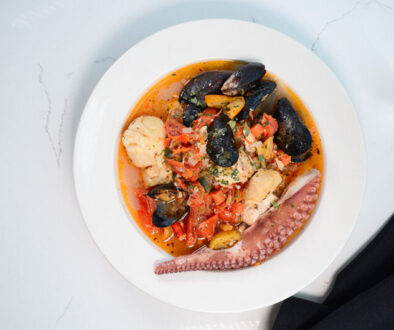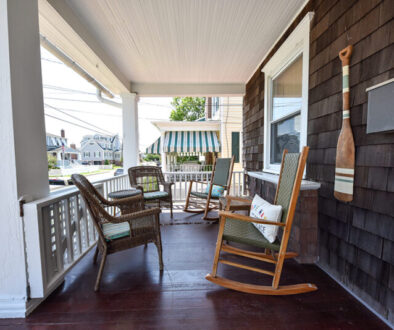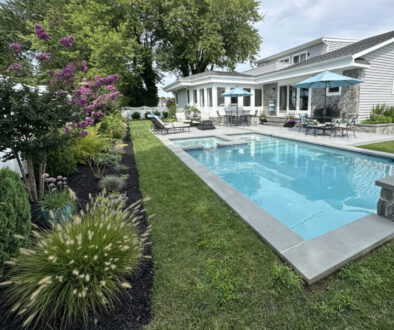Pastor Nicole Wilkinson

Originally from Ohio, Pastor Nicole Wilkinson arrived in Cape May when she came to lead the Presbyterian Church on Hughes Street in 2017. The most recent in a 125-year-long line of church leaders here, she holds a PhD in New Testament, has authored several books, and has lived in Turkey, South Africa, and Thailand. Armed with this rich and diverse background, Pastor Nicole leads with experience and wisdom.
From the other side of the world to Cape May County, Pastor Nicole lives with her twin sons, Ahmet and Nazim, just steps from the Delaware Bay in Lower Township.
Cape May Magazine: Tell me about your decision to become an ordained minister.
Pastor Wilkinson: People get more than they bargain for when they ask about that. My older brother was an atheist. High school into college I didn’t believe in anything; I thought I was too smart for that. When my mom died, it shook me up. Gradually I realized that the questions I was desperate for answers to were religious questions. I had been staying with my sister and brother-in-law and he was a Presbyterian minister. He had all these books on the shelves and was always open to any topics or conversations I wanted to explore. I was attending his church, probably just to be polite. Day by day I realized, ‘Yes, I do believe in God. Yes, I do belong in a Church.’ It was a straight shot in knowing that this is what I was being called for.
CMM: Of all the questions you had that led you to a life of ministry, is there still a question that you don’t have the answer to?
The biggie is the meaning of life, which is closely tied to “What happens when you die?” I think wanting to believe in something is the basis for coming to believe it. You have to feel the need, or it doesn’t mean anything.
CMM: Have you been in situations where an atheist has challenged you on your belief in God?
Yes, my youngest brother, who has since started to attend church, was appalled that I went to the seminary and once told me, “Your image of God is Dad at age 40.” Like anyone else, I can only imagine God in categories I already know. His argument was that I could believe whatever I wanted without signing up to an organized religion.
CMM: I hear people make that point so often. Many people claim they are not religious but spiritual.
I often say that it is nice to be spiritual by yourself, but you don’t get the challenge that you do when you are part of a religious community. So, the idea of being spiritual and not religious is like saying that I am spiritual in my head or alone watching the sunset, which is great — but the other part of it is asking how that plays out with other people and all of creation. You may have a one-on-one relationship with God, but Christianity teaches that that relationship is played out in our relationships with other people.
CMM: Is there anything about living and ministering in Cape May that you weren’t prepared for?
I had been coming to the Jersey shore on vacation all my life. I had always known Cape May as a beach town but hadn’t understood the small-town aspect until I got here. I realized that everyone is related to everyone and knows everyone. Like you — everyone I had met in various ways all knew you. There are connections in this town that any two people you know most likely know each other.
CMM: What has been your biggest challenge in being a pastor?
Covid was probably the biggest challenge for all the pastors. The challenge is always trying to get people to be aware and getting them to try us on for size. It’s getting them to know that the church is not a museum. Covid weirdly helped us with that because it kicked us out of our status quo. We had to do many things we hadn’t done, like having service on the beach, which was a huge boost in many ways. There was a boost in the energy, and there were new members.
CMM: Do beachgoers join in the service?
Many do wander over and it’s really nice. Sometimes people will stop for a while and go about their business and sometimes they’ll just plop down and become part of the congregation. Carol Obligato will bring the bell choir down there every month and then people really stop and listen.
CMM: Congregations and church membership do seem to be dwindling.
It’s a very grim picture if you’re comparing the state of mainline denominations to the way things were in the 50s and 60s and even in the 70s. There is the litany of complaints such as too many school activities on Sundays, the lack of commitment to voluntary organizations as there once was, people aren’t as religious as they used to be and so on. It’s not going to be the way it was, but we do have a gift to offer whatever community we’re in. I also do not think the church universal is dying in any way.
CMM: Of all the Christian denominations, is there one that seems to be attracting the most new members?
I think the non-denominational churches are doing that. The form of their worship service is more contemporary in many ways, and they have more freedom to do whatever. Non-denominational churches will often say the things that attract people like, “This is how to be a success in your life.” And I don’t think that’s a Christian message.
CMM: Have you had many challenges being a female pastor?
The Presbyterian Church has been ordaining women since about 1956, longer than most denominations. When I was in the seminary in the late 80s, I thought that was ancient history. I thought everything was just fine until I got into the church and was doing pulpit supply for whoever needed a preacher on a particular week and realized that some churches, even Presbyterian ones, were not open to having women preach. When I got into actually ministering in the church, I realized that for other denominations, it’s still a major issue.
CMM: Was the Cape May Presbyterian Church accepting of you as a woman?
They were. (laughing) Although there was one female member, who after my very first sermon, came to shake my hand and with a smile on her face said, “I was really hoping for a man.” Most groups that had split from the Presbyterian Church 30 or more years ago cited the ordination of women as one of the reasons for their split — more recently, it’s been gay-related issues. Many of those who did not accept ordained women as leaders are also the ones who are not sure about same-sex marriage or gay and lesbian ordination.
CMM: Tell me about the Presbyterian Church’s acceptance of gay ministers and gay marriage.
For about 20 years the Presbyterian Church had been going round and round about gay and lesbian ordination and then about marriage. I was so glad when they finally decided on those issues and put it behind them, but it cost them some congregations and members.
CMM: Can all Presbyterian churches perform same-sex wedding ceremonies?
They can, but the pastor has to be okay doing it and the session has to be okay with it being done at that church.
CMM: So, the church in Cape May can perform a same-sex marriage and feel that they are good with God for doing that but a church in a neighboring town could decide not to do it and also feel they are in good standing with God for their decision?
The Presbyterian Church feels that this is an expression of human sexuality, but they don’t want to force it on a congregation that does not believe that. It means that if a same-sex couple comes to a church and asks if their wedding can be performed and the pastor is okay with it, then the session has to examine that to see whether they feel it is okay.
CMM: Am I way off base saying that they are concluding what God does or does not approve of by a popular vote among themselves?
Most session decisions are unanimous and it’s also on them to do that prayerfully and thoughtfully.
CMM: Is that really effective if two churches decide on something prayerfully and thoughtfully and come up with two different conclusions?
It does seem unusual to have something like that left for each congregation to decide, but the Presbyterian Church had wrestled with that issue for so long that I think this was their way of saying, “Let’s move on as a denomination but still allow people to catch up later if they are not there yet.”
CMM: In the Presbyterian Church, is there a lot of compromising to arrive at something that is accepted as truth?
There is a lot of compromising, but the national church tends to be more liberal than many of the local congregations. I don’t know exactly why that is.
CMM: Can truth be arrived at through compromise?
The Presbyterian stance is that that is how the Holy Spirit works through community. In other words, if you’re off on your own deciding something, you’re more likely to get it wrong. Whereas if you are subjected to working together and arguing it out with the community, then truth emerges through the conversation.
CMM: What will be your legacy in the long line of pastors who’ve served at Cape May Presbyterian Church?
There are two things I’d like to be remembered for. One of the things that has happened in my six years as pastor is that we merged with a congregation from Wildwood. That is a big deal and can be very jarring and traumatic, but we managed it very smoothly. The second thing I’d like to be remembered for is being the person who led the church during the Covid pandemic. I’d like to be remembered for keeping things creatively new the entire time. The last thing I would ever want to be is a pastor who is just coasting along before retirement. It’s how I feel about living — I want to truly keep living until I die.
CMM: What are some of your rewards as a pastor in Cape May?
One of the biggest rewards is being entrusted with the memorial service for someone who has been in the church their whole life. The other rewarding joy is baptisms. We’ve had four baptisms this summer and one of them is my son, Nazim. These are just some of the rewards. It’s holy ground I am being invited to stand on.



